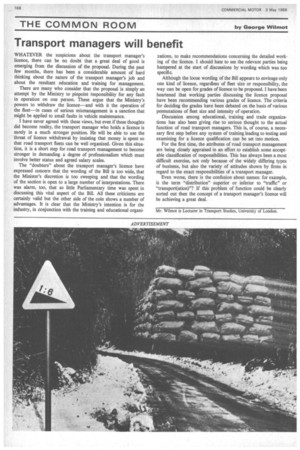THE COMMON ROOM by George Wilmot
Page 170

If you've noticed an error in this article please click here to report it so we can fix it.
Transport managers will benefit
WHATEVER the suspicions about the transport manager's licence, there can be no doubt that a great deal of good is emerging from the discussion of the proposal. During the past few months, there has been a considerable amount of hard thinking about the nature of the transport manager's job and about the resultant education and training for management.
There are many who consider that the proposal is simply an attempt by the Ministry to pinpoint responsibility for any fault in operation on one person. These argue that the Ministry's powers to withdraw the licence—and with it the operation of the fleet—in cases of serious mismanagement is a sanction that might be applied to small faults in vehicle maintenance.
I have never agreed with these views, but even if these thoughts did become reality, the transport manager who holds a licence is surely in a much stronger position. He will be able to use the threat of licence withdrawal by insisting that money is spent so that road transport fleets can be well organized. Given this situation, it is a short step for road transport management to become stronger in demanding a degree of professionalism which must involve better status and agreed salary scales.
The "doubters" about the transport manager's licence have expressed concern that the wording of the Bill is too wide, that the Minister's discretion is too sweeping and that the wording of the section is open to a large number of interpretations. There was alarm, too, that so little Parliamentary time was spent in discussing this vital aspect of the Bill. All these criticisms are certainly valid but the other side of the coin shows a number of advantages. It is clear that the Ministry's intention is for the industry, in conjunction with the training and educational organi
zations, to make recommendations concerning the detailed working of the licence. I should hate to see the relevant parties being hampered at the start of discussions by wording which was too specific.
Although the loose wording of the Bill appears to envisage only one kind of licence, regardless of fleet size or responsibility, the way can be open for grades of licence to be proposed. I have been heartened that working parties discussing the licence proposal have been recommending various grades of licence. The criteria for deciding the grades have been debated on the basis of various permutations of fleet size and intensity of operation.
Discussion among educational, training and trade organizations has also been giving rise to serious thought to the actual function of road transport managers. This is, of course, a necessary first step before any system of training leading to testing and examining for a licence qualification can be set into motion.
For the first time, the attributes of road transport management are being closely appraised in an effort to establish some acceptable classification of responsibilities. This has always been a most difficult exercise, not only because of the widely differing types of business, but also the variety of attitudes shown by firms in regard to the exact responsibilities of a transport manager.
Even worse, there is the confusion about names: for example, is the term "distribution" superior or inferior to "traffic" or "transport(ation)"? If this problem of function could be clearly sorted out then the concept of a transport manager's licence will be achieving a great deal.
Mr. Wilmot is Lecturer in Transport Studies, University of London.




































































































































































































































